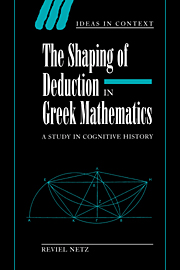Book contents
- Frontmatter
- Contents
- Preface
- List of abbreviations
- The Greek alphabet
- Note on the figures
- Introduction
- A specimen of Greek mathematics
- 1 The lettered diagram
- 2 The pragmatics of letters
- 3 The mathematical lexicon
- 4 Formulae
- 5 The shaping of necessity
- 6 The shaping of generality
- 7 The historical setting
- Appendix The main Greek mathematicians cited in the book
- Bibliography
- Index
- Ideas in Context
Appendix - The main Greek mathematicians cited in the book
Published online by Cambridge University Press: 15 August 2009
- Frontmatter
- Contents
- Preface
- List of abbreviations
- The Greek alphabet
- Note on the figures
- Introduction
- A specimen of Greek mathematics
- 1 The lettered diagram
- 2 The pragmatics of letters
- 3 The mathematical lexicon
- 4 Formulae
- 5 The shaping of necessity
- 6 The shaping of generality
- 7 The historical setting
- Appendix The main Greek mathematicians cited in the book
- Bibliography
- Index
- Ideas in Context
Summary
APOLLONIUS
Active at around the end of the third century BC, Apollonius produced a great œuvre, ranging from the theory of irrational numbers to astronomy. Only some parts of one work are extant in Greek. This work, however, is the Conics, an outstanding presentation and development of the main advanced mathematical theory of pre-modern mathematics:
Heiberg, J. L. (1891–) Opera Omnia (2 vols.). Leipzig.
Books I–III are in the first volume. Book IV, together with Eutocius' commentaries, is in the second volume (Eutocius, a sixth-century AD commentator, was an intelligent scholar and mathematician).
ARCHIMEDES
Traditionally given the dates 287–212 BC, Archimedes is one of the greatest mathematicians of all times. A relatively large number of his works has survived. The works are usually dedicated to a single set of problems. Archimedes gradually develops the tools for dealing with those problems, and then, in remarkable tours-de-force, the tools are brought to bear on the problems. Measurement of curvilinear objects is a constant theme, but for that purpose he uses a very wide range of techniques, from almost abstract proportion theory (in the SL, CS) to mechanical considerations (QP, Meth.). Mechanics, especially, was an Archimedean interest, and he made a seminal contribution to the mathematisation of the physical world, in his PE, CF. The edition used here is:
Heiberg, J. L. (1910–) Opera Omnia (3 vols.). Leipzig. I use the following abbreviations for Archimedean treatises:
Vol 1:
SC On Sphere and Cylinder
DC Measurement of Circle
[…]
- Type
- Chapter
- Information
- The Shaping of Deduction in Greek MathematicsA Study in Cognitive History, pp. 313 - 315Publisher: Cambridge University PressPrint publication year: 1999



